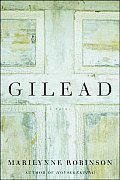
The concept behind Marilynne Robinson's Gilead is interesting and she succeeds in the most part. The novel is written as a long letter being written by a 77-year-old minister in Gilead, Iowa, to his 7-year-old son. I like how this man, who is in the slow process of dying, takes time to write a beautiful letter to his son. Part eulogy, part spiritual guide and part genealogy, the letter tells the story of the Ames family focusing on the three generations of preachers. "I'm trying to make the best of our situation. That is, I'm trying to tell you things I might never have thought to tell you if I had brought you up myself, father and son, in the usual companionable way."It was a heartfelt, old fashioned story, but I wasn't interested in it. I kept on waiting for some passage to blow me away, or some great fatherly advice to hit home. The writing was sparse and tolerable, but I never became engaged in the story. John Ames is leaving his legacy in words, yet he never seems to say or tell anybody what he really feels. Do as I say, not as I preach? Really?
Ames is a genteel man with an obvious good heart. At least according to him. I'm alright with that because one of the more difficult things to do in art is to look at yourself critically and express your faults for the world to see. However, Ames wasn't writing for the world, he was writing for his son and only his son. Shouldn't this have made him more willing and able to point out his own flaws? And I can only hope to have a wife as saintly as his, but she seems too good to be true. I guess to a minister, he sees her as a blessing. I know we all wish/hope someone would look upon us in such a way. Unrealistic? I don't know. According to Ames, her only fault was in the way she spoke when they first met. Adding to her saintliness, Ames doesn't think of it as a flaw. He sees her poor vocabulary and grammar as an endearing trait.
What Ames and Robinson in effect, were able to do, was preach without being too religious. Ames used "the Scripture" as a way of explaining his feelings instead of using it to tell us how to feel. In fact, I was overcome with how simple he made religion seem. There was no heavy handed preaching, no speaking down to his son, i.e. the reader. Religion in this setting and in Ames's life was a connection to the past, to his father and grandfather. I envied this relationship even if I don't envy their religion. Ames doesn't know if he's going to be the last in the line of ministers and he doesn't much care. He turns his intentions on letting his son know something about his family before their story was lost forever, before their history was forgotten. Now that it's written, it is so.
Gilead had a lot of hype and I can see why. There were some parts that spoke the truth as I see it and I like the idea of sitting down as an old man and writing my son or grandson a letter in this fashion. For making me think of the future and dream of a day when I can sit with my child and tell him about his grandfather and grandmother, I thank Robinson. I know I'll have some stories to tell.
Now reading:
Bohumil Hrabal Too Loud a Solitude
Alberto Manguel A History of Reading
On deck:
Umberto Eco The Mysterious Flame of Queen Loana
2 comments:
I liked his simple religious vision too, even if I'm not much interested in organized religion -- the main character seemed to see beyond organized religion into the deeper things that matter.
And I really like epistolary novels, for some reason -- I like getting a story shaped by one character for another. There's something about the care and the mixture of self-revelation and self-justification that goes into letter-writing that I find fascinating.
Dorothy - I couldn't agree with you more. And the more I think about it, the more I realize I liked the novel. I wrote the post last night, right after I had finished the novel (and right after the Sox beat the Yankees) and I don't think I had time to let the book flow through me.
Post a Comment